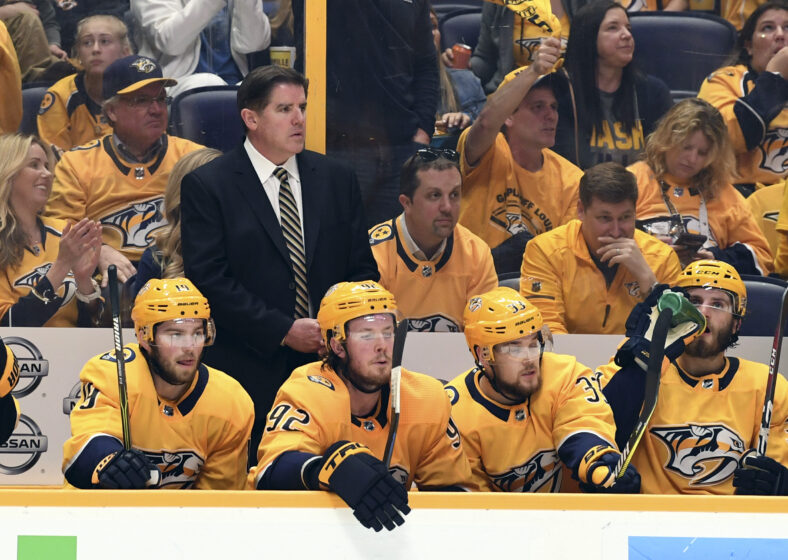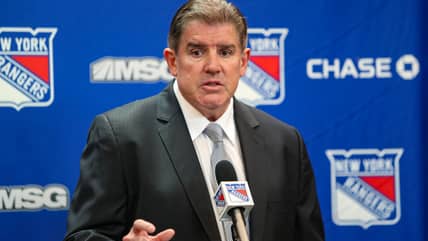False Peter Laviolette narrative not fair to Rangers embattled coach

Listening to some members of the media, one might believe that what’s happening to the New York Rangers under coach Peter Laviolette in 2024-25 was entirely predictable based on his “history.”
As the Rangers sink deeper into a shocking malaise, a narrative has emerged, one that’s been endlessly repeated in hockey circles: The Rangers falloff from last season was almost a foregone conclusion, because Laviolette’s outstanding NHL career behind the bench has been marked by regression during his second season with other teams. It’s been offered up so frequently since the Rangers slide from 12-4-1 to 15-15-1, in fact, that the idea seems to have become gospel.
The problem is that said narrative is almost completely false, and in fact, something close to the opposite has occurred at least a good portion of the time.
Related: Rangers trade rumors: ‘Uncomfortable’ handling of Mika Zibanejad to what end?
Rangers woes in Peter Laviolette’s 2nd season are anomaly

Laviolette has led six teams across his 23-year NHL coaching career. Before this season, only one other team he’s coached has suffered a noticeable backslide in his second season – the New York Islanders, who gave Laviolette his first coaching job in 2001-02. The Islanders totaled 96 points that season before dropping to 83 in Year 2, leading to an unceremonious firing by general manager Mike Milbury.
Prior to the current disaster unfolding at Madison Square Garden, though – one which clearly runs so much deeper than who’s standing behind the bench – that supposed “pattern” exists only as an exception. Laviolette replaced the fired Paul Maurice with the Carolina Hurricanes in 2003-04 and posted a 20-22-6 mark in his 52 games. However, in 2005-06 (that was the next season because 2004-05 was canceled due to a lockout), the Hurricanes piled up 112 points and delivered Laviolette his one Stanley Cup championship.
After being fired 25 games into his fifth season with Carolina – and ironically being replaced by Maurice – Laviolette was brought in to replace John Stevens with the Philadelphia Flyers in December 2009. He posted a 28-24-5 mark across his 57 games and authored a stunning run to the Stanley Cup Final, where the Flyers lost in six games to the Chicago Blackhawks.
Related: 3 Rangers takeaways after another loss to last-place foe
Philadelphia didn’t get as far in Laviolette’s second season, falling in the second round of the Stanley Cup Playoffs, but that club was 47-23-12 and had 106 points.
Laviolette moved on to the Nashville Predators for the 2014-15 season and led them to 104 points. While the Preds weren’t as good in the regular season in 2015-16 under Laviolette, they were only slightly worse with 96. That group also went farther in the postseason, reaching the Western Conference quarterfinals a year after losing in the first round.
Even in Laviolette’s shorter stint in charge of the Washington Capitals that began with the pandemic-shortened 2020-21 season, his team delivered strong results in Year 2. The Caps had an excellent first season with Laviolette in charge, posting a 36-15-5 record over the 56-game slate before falling to the Boston Bruins in five games in the first round of the playoffs. There was no drop off in the second season, though, when Washington had 100 points before losing again in its first-round playoff series, this time to the Florida Panthers.
Rangers issues run deeper than coaching

That’s three of Laviolette’s six teams that reached the 100-point mark in his second season. Yet the idea that the 60-year-old represents a quick-fix, one-season proposition has been constantly thrown into analyses of the Rangers problems, an incorrect assertion that apparently isn’t being researched, just regurgitated in an attempt to at least partially explain the shocking demise.
Perhaps the story is based in part on Laviolette’s truncated first seasons with the Hurricanes and Flyers, when he guided a rebuilding Carolina roster to a solid result in 2003-04, and then pushed all the right buttons as Philadelphia surged to the Cup Final in 2009-10. However, Laviolette has for the most part experienced equal or greater levels of success in his second seasons, not less.
What’s happening with Laviolette’s current team has no doubt left him completely vexed, especially in the stunning current 3-11-0 stretch. There seems little question that acrimony between general manager Chris Drury and the players over his handling of the Barclay Goodrow and Jacob Trouba departures is playing a major part in the dark mood and bad feelings swirling around this roster – and it appears to have left the coach with few answers, and perhaps relatively little control, since he tries to fix a situation that might not have that much to do with his methods.
Remember, the Rangers established franchise records with 55 wins and 114 points last season, won the Presidents’ Trophy and reached the Eastern Conference Final.
But the current mess is real, and it’s probably early in the process of how it will shake out, with more personnel moves sure to come that may or may not solve a complex problem. Yet the repeated insinuation that the Rangers highly-accomplished, Stanley Cup-winning coach is to blame because of a nonexistent trend of Year 2 regression, obscures the real issues here and does a disservice to Laviolette.
Now, if the argument is that Laviolette’s message is no longer being received by the players, or that his systems are lacking, for example, then that’s fair game to land him on the chopping block. But not the aforementioned false narrative.
Firing him over the collapse would unfairly scapegoat Laviolette and add to an actually real, developing trend that claimed his two immediate predecessors: Locker-room rebellions that have resulted in the organization cycling through three coaches in five seasons.
More About:New York Rangers News







